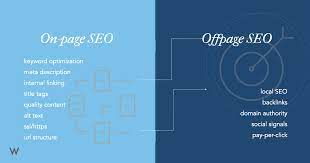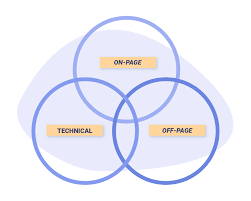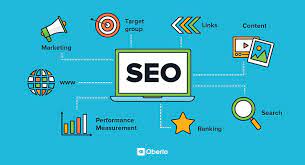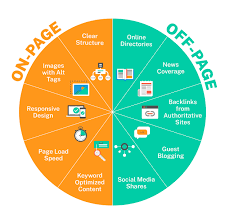Unlocking Success: Building an SEO-Friendly Website for Online Growth
The Importance of Creating an SEO-Friendly Website
In today’s digital age, having a strong online presence is crucial for the success of any business. One key aspect of establishing a robust online presence is ensuring that your website is SEO-friendly. Search Engine Optimization (SEO) plays a vital role in determining how well your website ranks on search engine results pages, ultimately affecting your visibility and traffic.
What is an SEO-Friendly Website?
An SEO-friendly website is designed and developed with search engines in mind. It incorporates various elements and features that make it easier for search engine crawlers to index and understand the content on the site. By adhering to SEO best practices, you can improve your website’s chances of ranking higher in search engine results for relevant keywords and phrases.
The Benefits of an SEO-Friendly Website
Creating an SEO-friendly website offers numerous benefits, including:
- Improved Visibility: An SEO-friendly website is more likely to appear higher in search engine results, increasing its visibility to potential visitors.
- Increased Traffic: Higher visibility leads to increased organic traffic to your website, as more users are likely to click on top-ranking search results.
- Better User Experience: Optimising your site for SEO often involves improving user experience by making it faster, mobile-friendly, and easy to navigate.
- Higher Conversions: A well-optimised website can attract qualified leads and convert them into customers more effectively.
- Long-Term Success: Investing in SEO-friendly practices can help your website maintain its visibility and relevance over the long term.
Tips for Creating an SEO-Friendly Website
To ensure that your website is optimised for search engines, consider implementing the following tips:
- Keyword Research: Identify relevant keywords that your target audience is searching for and incorporate them strategically into your content.
- Optimise On-Page Elements: This includes meta tags, headings, image alt text, and internal linking structure.
- Create High-Quality Content: Publish informative, engaging content that provides value to your audience and encourages sharing and backlinks.
- Mobile Responsiveness: Ensure that your website is mobile-responsive to cater to users accessing it from different devices.
- Improve Page Speed: Optimise loading times to enhance user experience and prevent visitors from bouncing off your site.
- Become HTTPS Secure:
In Conclusion
An SEO-friendly website lays the foundation for a successful online presence by improving visibility, attracting more traffic, enhancing user experience, increasing conversions, and ensuring long-term success. By implementing best practices such as keyword research, on-page optimisation,content creation,mobile responsiveness,and page speed improvements,you can create awebsite that not only ranks wellonsearch engines but also delivers value toyour audience.
8 Essential Tips for Creating an SEO-Friendly Website
- Ensure your website has a clear site structure with easy navigation.
- Use relevant keywords in your page titles, meta descriptions, and content.
- Optimize your images by using descriptive filenames and alt text.
- Create high-quality, original content that provides value to your audience.
- Make sure your website loads quickly on both desktop and mobile devices.
- Incorporate internal linking to help search engines discover and index all pages of your site.
- Regularly update your website with fresh content to keep it relevant and engaging.
- Avoid duplicate content issues by creating unique content for each page of your website.
Ensure your website has a clear site structure with easy navigation.
To enhance the SEO-friendliness of your website, it is essential to ensure that your site has a clear and well-organised structure with easy navigation. A logical site structure not only helps search engine crawlers better understand and index your content but also improves the overall user experience. By implementing intuitive navigation menus, user-friendly URLs, and a hierarchical layout, you can make it easier for visitors to find the information they are looking for quickly. This not only boosts your site’s SEO performance but also increases user engagement and encourages them to explore more of your content.
Use relevant keywords in your page titles, meta descriptions, and content.
In order to create an SEO-friendly website, it is essential to incorporate relevant keywords strategically throughout your page titles, meta descriptions, and content. By using keywords that accurately reflect the content of your web pages, you can improve their visibility and relevance to search engines. This practice not only helps search engine crawlers understand the context of your website but also enhances the user experience by delivering content that aligns with what users are searching for. By integrating relevant keywords effectively, you can boost your website’s chances of ranking higher in search engine results and attracting more organic traffic.
Optimize your images by using descriptive filenames and alt text.
To enhance the SEO-friendliness of your website, it is essential to optimise your images by using descriptive filenames and alt text. By giving your images relevant names and providing informative alt text, you not only improve accessibility for visually impaired users but also help search engines understand the content of your images. This practice can boost your website’s visibility in image searches and contribute to overall SEO performance.
Create high-quality, original content that provides value to your audience.
Creating high-quality, original content that offers genuine value to your audience is a fundamental aspect of building an SEO-friendly website. By producing informative and engaging content that resonates with your target audience, you not only improve your website’s credibility and authority but also increase the likelihood of attracting organic traffic. Valuable content that addresses the needs and interests of your visitors can drive user engagement, encourage social sharing, and ultimately contribute to higher search engine rankings. Prioritising quality over quantity when it comes to content creation is key to establishing a strong online presence and fostering lasting relationships with your audience.
Make sure your website loads quickly on both desktop and mobile devices.
Ensuring that your website loads quickly on both desktop and mobile devices is a critical aspect of creating an SEO-friendly website. Fast loading times not only enhance user experience but also contribute to higher search engine rankings. Search engines like Google consider page speed as a ranking factor, so a speedy website can help improve your visibility in search results. By optimising your site for quick loading across all devices, you can provide a seamless browsing experience for visitors and increase the likelihood of retaining their interest and engagement with your content.
Incorporate internal linking to help search engines discover and index all pages of your site.
By incorporating internal linking into your website, you can assist search engines in discovering and indexing all pages of your site. Internal linking establishes connections between different pages on your website, guiding search engine crawlers to navigate and index your content more effectively. This not only enhances the overall structure and coherence of your site but also improves its visibility and accessibility in search engine results. By strategically implementing internal links, you can ensure that all valuable pages on your website are properly indexed and contribute to boosting your SEO performance.
Regularly update your website with fresh content to keep it relevant and engaging.
To maintain an SEO-friendly website, it is essential to consistently update your site with fresh and engaging content. By regularly adding new content, you not only keep your website relevant to both users and search engines but also provide valuable information that can attract and retain visitors. Fresh content demonstrates to search engines that your website is active and up-to-date, which can positively impact your search engine rankings and overall online visibility. Keeping your website updated with quality content is key to building authority in your industry and establishing a loyal audience base.
Avoid duplicate content issues by creating unique content for each page of your website.
To maintain an SEO-friendly website, it is essential to avoid duplicate content issues by ensuring that each page on your site features unique and original content. Search engines value fresh and distinct content, so creating bespoke content for every page not only helps in improving your site’s search engine rankings but also enhances user experience. By crafting unique content tailored to each page’s purpose and target audience, you can effectively engage visitors, drive organic traffic, and establish credibility with search engines.





